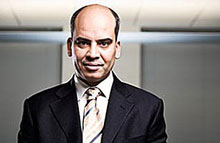
Abderrahim Foukara, Washington Bureau Chief for Al Jazeera. Photo by Martin Adolffson.
Social media as a force in spreading the 'Arab Spring' was the topic of a talk by Al-Jazeera Washington Bureau Chief Abderrahim Foukara on Feb. 17 as part of the Halle Speaker Series.
"I think the so-called revolution that started in Tunisia, if it had followed a geographical progression, I have a feeling that Egypt would not have happened and therefore maybe the rest of the Arab world may not have erupted," he said.
Had it moved on first to Libya, "one got the feeling that Moammar Gadhafi would have nipped it in the bud and stopped it in its tracks," said Foukara.
"The world had come to accept that Hosni Mubarak in Egypt, Ali Abdullah Saleh in Yemen and others will just pass power down to their progeny and turn the republics in the Arab world into monarchies," he said.
But "look what's come out of tiny Tunisia. A wave of change has unleashed forces that we do not yet know where they are going to take us."
The Moroccan-born journalist showed a video of Iraqi-born Wafaa Bilal, an assistant professor of photography at New York University, who had a camera installed in the back of his head to see life behind him, an act born of Bilal's escape from Saddam's putdown of the rebellion in southern Iraq in the 1990s.
"Here is the early beginnings of the Arab world using social media to make a point," Foukara explained.
Foukara's next video was a collection of social media, showing the beginning of a revolution unfolding, the mainstream media playing catch-up while the social networks had the best coverage. The video showed social networks jumping to Egypt to begin the protests there and the U.S. government using Twitter to make its voice heard.
"It's sometimes described as the social media revolution, as the Al Jazeera revolution," he noted.
"We saw young people who did not necessarily subscribe to any particular ideology. Their socioeconomic situation was dire and they wanted it changed. And they felt that the political shackles were too heavy on them and they wanted those shackles broken. It was one of those moments when the United States and the Arab world seemed to have found a common language."
He continued: "This thing called Arab Spring has a life of its own and its change has been wonderful and the promise of change is wonderful."
But, Foukara asked, "What happens when the dust settles? The only way to define a revolution is the extent to which it realizes citizenship for all. We all become citizens with rights and responsibilities enshrined in a constitution that is enforceable in a way that is similar to the Constitution in the United States."
He thinks "this thing rumbling through the Middle East and North Africa will continue for a long time. We have not yet begun to know the final outcome of this thing. If 2011 was the year of euphoria, the year of 2012 and beyond will be the year of unpredictability and surprises."
